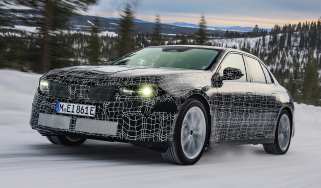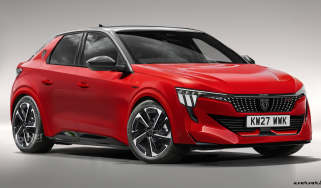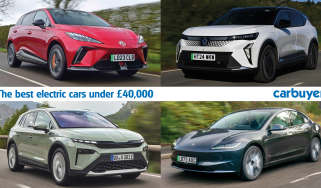Abarth 595C convertible
"The Abarth 595C isn't the best car in its class, but it can claim to be the one with the most character"
Pros
- Reasonable fuel economy
- Fast and agile
- Stylish looks
Cons
- Firm ride
- Not a full convertible
- Poor rear visibility with roof down
The Abarth 595C is the convertible version of the Abarth 595 hatchback, which uses the Fiat 500 as its base. There are convertible versions of both the 595, 595 Trofeo, 595 Turismo and 595 Competizione models.
All come with an electric fabric roof that folds down to sit on top of the boot, leaving the side windows and pillars in place. You don’t quite get the full convertible feel, because so much of the car’s structure remains in place, but there’s no denying you get the open-top motoring experience. The convertibles get the same sporty alloy wheels as their hatchback counterparts and the same turbocharged 1.4-litre petrol engine, which is engineered to produce more power as you move up the range.
Abarth 595 convertibles come equipped with the latest Uconnect infotainment system and styling packs that vary depending on which specific version you go for.
The 595C line-up consists of four cars: the standard 143bhp 595, the mid-range 158bhp Trofeo and 163bhp Turismo, topping out with the hardcore 178bhp Competizione version. The latter comes with stiffer suspension and the option of a limited-slip differential to improve the car’s performance in corners. It’s the one to go for if you want the fastest, most uncompromising 595C.
More reviews
In-depth reviews
Thanks to a relatively low weight, economy is reasonable for a car focused principally on performance. Practicality is hampered by the car’s size and a fabric roof that bunches up at the rear of the car isn’t great for rear visibility, even if doesn’t impinge on boot space. All of the cars in the range have firm suspension, particularly the Competizione, so poorly surfaced roads can send big jolts into the cabin.
Overall, the 595C is a fun-to-drive convertible that offers buyers a stylish city car with a decent dose of performance. It feels nimble, has a characterful engine and the gearbox is a pleasure to use. The MINI Cooper S is the car’s most direct rival and is undoubtedly a better all-rounder, but the Abarth has plenty of its own particular charm that will prove decisive for some buyers.
There's also a limited-edition Abarth 695C in the form of the 178bhp Rivale, made as a tie-in with Italian luxury yacht builder Riva.
MPG, running costs & CO2
The Abarth 595C comes in four different power outputs, but because they all use the same turbocharged 1.4-litre petrol engine (tweaked to provide more or less power), Abarth claims roughly the same efficiency figures for all models in the range. Economy stands at 47.1mpg with CO2 emissions of 139g/km across the board, although if you go for the automatic gearbox, those figures improve to 48.7mpg and CO2 emissions of 134g/km.
Road tax costs a flat £140 a year across the board.
The MINI Cooper S is quicker from 0-62mph than all but the range-topping Competizione version of the 595C. The MINI is also slightly more economical than the 595C range, but not significantly.
Engines, drive & performance
There are four 595C models to choose from. The standard 595C comes with 143bhp, the Trofeo has 158bhp and the Turismo has 163bhp. The range-topping Competizione has 178bhp and is intended to be the most hardcore version. The entry-level car can manage 0-62mph in 7.8 seconds, the Turismo takes 7.3 seconds and the Competizione does it in 6.7 seconds.
The 595C Competizione is the best of the bunch from a driving perspective, thanks to firmer suspension than the other three models in the range due to stiffer shock absorbers. This firmness and the car’s accurate steering and slick gearbox mean it can change direction with great speed and balance. The range-topper is also the only model to have the sporty ‘Record Monza’ exhaust, which adds another layer of pleasure to the 595C driving experience. It comes as standard with Trofeo and Competizione model and its volume can be adjusted using a Sport button. There’s no escaping that the firm ride makes the Competizione pretty uncomfortable after a while, but on the right road it’s a real joy to drive.
Interior & comfort
The 595C comes with Fiat’s five-inch Uconnect infotainment screen as standard, and it can be upgraded to a seven-inch screen as an option. The rest Trofeo gets a seven-inch screen with some extra features as standard. Sporty bucket seats on the Competizione model look great and are surprisingly comfortable, too but the seating position feels too raised for a car with such sporty pretensions.
All 595Cs feel very firm, particularly the Competizione and this can make it an uncomfortable car on all but the smoothest roads. Similarly, the noisy, almost raucous, exhaust note is lots of fun when you’re in the mood, but it can get a bit tiring when you want a more relaxed journey.
Practicality & boot space
The 595C is a small, three-door hatchback, so inevitably practicality isn’t its strong suit. Getting in the back isn’t a hugely comfortable experience and there’s only room for two people once there – although rear-seat passengers do have a relatively decent amount of legroom, even with tall people sitting in the front.
When you put the fabric roof down, the material folds up and sits on the rear of the car rather than disappearing from view, which does affect rear visibility. Rear parking sensors are fitted to help, but they don’t solve the problem entirely. The upside of the roof arrangement is that you still have a usable boot on a sunny day when it might otherwise have been full of the roof.
It’s a good job the roof doesn’t encroach on boot space, as it’s already pretty tight at 185 litres. The rear seats fold down to create a 550-litre space if you really need some extra room. A MINI has slightly more space, plus its boot is easier to use; the shape of the 595C means the boot lip is relatively high and the opening is quite narrow.
Reliability & safety
Fiat has historically had a reputation for making unreliable cars, which doesn’t bode particularly well for Abarth, as the 595 is based on the Fiat 500C. The Abarth model doesn't sell in sufficient numbers to make it into our Driver Power customer satisfaction survey, but the Fiat 500 came 65th out of 75 cars in 2018 and Fiat came 23rd out of 26 brands in the manufacturer rankings.
Price, value for money & options
The entry-level 595C comes with 16-inch alloy wheels, a five-inch touchscreen infotainment system (with Bluetooth, USB, an auxiliary port and DAB radio), air-conditioning and electric door mirrors.
The mid-range Trofeo and Turismo models get 17-inch alloy wheels, sports seats and dual-zone climate control, while the range-topping Competizione adds sporty bucket seats and the active 'Record Monza' exhaust, as well as being eligible for a raft of additional options – such as wheels and colour schemes – not available on the less powerful models.
Options include sat nav, a bigger infotainment screen, a Beats stereo, an electric sunroof, alternative alloy-wheel designs, a carbon-fibre finish for the dashboard and sporty graphics outside.
Prices for the 595C start at just over £17,000 and climb to around £23,000 for the top-of-the-range model, which is about £2,000 more than the hatchback versions of the car. The 695 Rivale takes inspiration from Riva yachts, so there’s a plush interior unique to the model that includes blue leather and an optional mahogany pack, as well as satin chrome touches and an exclusive blue and grey paint scheme.












